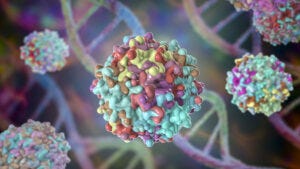March 13, 2023

Novartis has extended an AAV capsid licensing agreement with Voyager Therapeutics, a week after AbbVie doubled down on its partnership with Capsida Biotherapeutics.
Novartis has exercised its option to expand an agreement with Voyager Therapeutics, granting it additional access to Voyager’s TRACER platform which engineers’ in vivo adeno-associated virus (AAV) capsids with enhanced properties.
The original agreement, announced last year, saw Novartis license AAV capsids for up to three central nervous system (CNS) targets. With an additional payment of $25 million, building upon the original $54 million deal, Novartis gains AAV capsids for two more targets. Novartis is hopeful these capsids will accelerate the development of gene therapies for neurological diseases.

Image: DepositPhotos/katerynakon
The news comes a week after AbbVie and Capsida Biotherapeutics announced an expansion of their original 2021 partnership. AbbVie is providing an upfront payment of $70 million to develop three ophthalmic gene therapy programs, expanding its original focus on neurodegenerative disease. “We are not disclosing specific disease areas or number of targets,” a Capsida spokesperson told BioProcess Insider.
Both Big Pharma developments strengthen Voyager and Capsida’s respective gene therapy platforms and come off the back of attention from other big industry names.
Voyager inked a $30 million licensing agreement with Pfizer and a $175 million collaboration with Neurocrine Biosciences earlier this year. Capsida, meanwhile, has additionally partnered with Prevail, a wholly owned subsidiary of Eli Lilly, to develop gene therapies for CNS diseases.
The expanded deals also come following a period of biopharma U-turns in the cell and gene therapy space. GlaxoSmithKline reflected in its full year 2022 results its decision to end its investment in cell and gene therapy R&D. Meanwhile, last year Sanofi ended a long-term hemoglobinopathies partnership with genomics firm Sangamo Therapeutics and scaled back on other advanced therapy programs, including a Friedreich’s ataxia gene therapy candidate collaboration with Voyager Therapeutics first forged in 2019.
About the Author
You May Also Like



